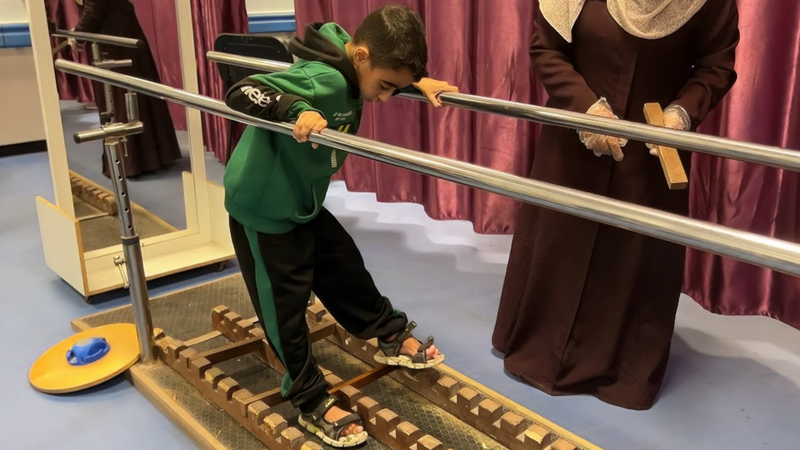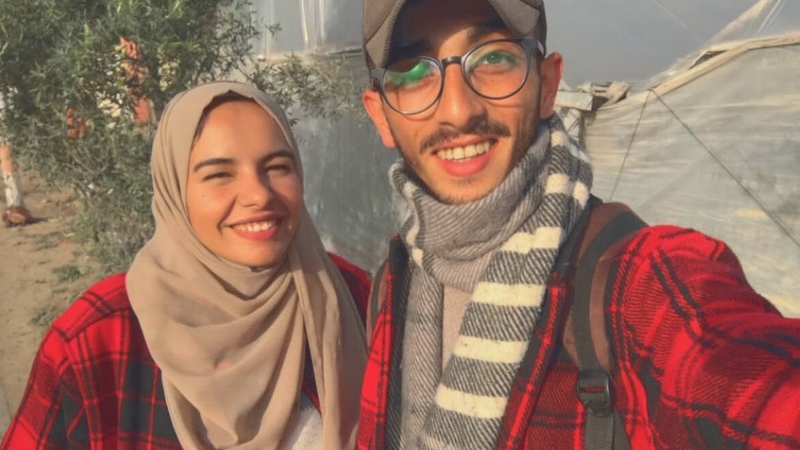The Electronic Intifada 20 June 2025

Yazan Daloul getting treatment for his injuries.
I have always had a phobia of hospitals and by January of this year, I had completely distanced myself even from the injured – perhaps out of fear that I might become one of them, as I was living under the same conditions.
But out of nowhere, my mother’s health deteriorated – she fell a number of times and had to undergo two major surgeries, one on her leg and another on her spinal cord.
So I accompanied my mother as a patient companion for three months. I was by her side in overcrowded wards in two hospitals, Al Helou International Hospital and Wafaa Hospital, both in Gaza City.
I supported and cared for her, seeing it as an opportunity from God to give back a fraction of the love she has always shown me.
But they were testing times. In my mother’s small room alone there were seven patients in what used to be a four bed space.
Others were less lucky. I saw rooms of the same size with as many as 13 patients in them.
There was not enough staff and with no electricity, there was also no way to cool rooms and the heat was stifling. Constant bombardments had blown the glass out of windows, which were instead sometimes covered with plastic sheeting if anything at all, and damaged blood pressure monitors stood unworkable next to patient beds.
I also discovered a whole new world as I overcame my phobia and learned that all patients, whether children or adults, have their own stories about Israel’s genocidal war machine.
It took time.
At first, I decided not to make acquaintances with anyone in the hospital. I was overwhelmed with chores at home, cooking and cleaning for seven people.
But then, being only 21, and with so much time to spare at the hospital, I got curious, particularly about the child patients, their small bodies looking even smaller in the large hospital beds.
“Spoiled child”
One child in particular affected me – Yazan Daloul.
Yazan’s family name, Daloul, means a spoiled child in Arabic.
So I used to call him Yazan al Daloul – or Yazan the spoiled child.
Yazan, 10, lost his father, Mahmoud, and brother, Tamer, along with five other relatives, in December 2024 after an Israeli airstrike on a building sheltering the family.
His mother barely survived with fractures to her pelvis, spinal cord and foot. Yazan was injured and brought to hospital unconscious.
He was in a coma for 56 days.
When he woke up, on 22 February 2025, he was unable to remember anything. He now uses a wheelchair.
I remember the day I met him. I was bored of my routine at the hospital, so I went for a walk in the corridors.
The corridors long stopped to be mere passageways. They are instead crowded with patients and families, children crying and, above all, an inescapable smell of blood and death.
I happened to walk past when I heard Yazan shout at whom I later learned was his aunt, Rawya Daloul, 56.
“Why is my father not beside me in the hospital?”
My heart shattered hearing his words.
I kept my distance at first, afraid I might say something to Yazan that I shouldn’t. I had learned from some of the medical staff of his situation that – due to trauma – he was quick to anger.
But one day, by chance, I saw him laughing and smiling for the first time. He had just finished a physical therapy session and seemed in a good mood for a change.
I ventured to ask him how he was and introduced myself. He answered, “Alhamdulillah.”
That gave me the courage to ask his aunt if I could speak with him. She welcomed it warmly.
And while our first conversation was short, over the days and weeks that followed I made friends with this beautiful boy, with eye lashes so long that I would often joke that I wanted to take them.
Every time he would firmly reject that idea, but I noticed he did love to take selfies.
He appeared in my life at the perfect moment. I was depressed and anxious about spending so much time in a hospital.
His smile, despite his many painful losses, taught me that whatever is thrown at us, we must always trust in God’s plan.
Love heals

Sabreen al-Khairy and her fiancee, Tamer Dieb.
Sabreen al-Khairy, 27, also gave me a renewed sense of hope and strength.
Sabreen was supposed to have been married by the time I met her.
But on 18 March, during the holy month of Ramadan, Israel bombed the home of her uncle in the Tel al-Hawa neighborhood of Gaza City, where she had – unusually – been staying.
“Life was simple… and then it all changed,” she told me in one of our conversations.
Maryam al-Khairy, 10, Sabreen’s cousin, was killed in the attack. Sabreen’s own injuries were so severe that she had to have her right leg amputated below the knee.
She broke several bones in her back and was lucky to escape paralysis.
Her wedding preparations had been underway – even in the middle of a war zone, she and her family seemed determined to find ways to create joy. There were always relatives there to visit her, sisters and cousins, always talking and joking with her.
She was helped immeasurably by her fiancé, Tamer Dieb, 27, who remained steadfast in his commitment to her and would visit every day with encouragement and gifts.
He even managed to bring her a meal of chicken and vegetables one day, a rare and expensive luxury in Gaza.
I hesitated to speak with Sabreen. She was in a lot of pain when she was first brought to the hospital and I didn’t want to intrude.
I felt deeply sorry for her and honestly didn’t know what to say in the face of her suffering. But eventually, I did speak with her, though when the pain hit, she would ask to be alone.
She told me she was content with her life, despite everything. She told me that she was confident that “God will reward me with happiness and love,” no doubt helped in her faith by Tamer’s obvious devotion.
I was struck at her attitude, how she handled her tragedy with grace and tried to make her pain meaningful.
I was reminded again and was deeply affected by our ability to endure so much pain and still smile, still look forward, even as we shoulder what no one should ever have to shoulder.
Sara Awad is an English literature student and writer based in Gaza City.


